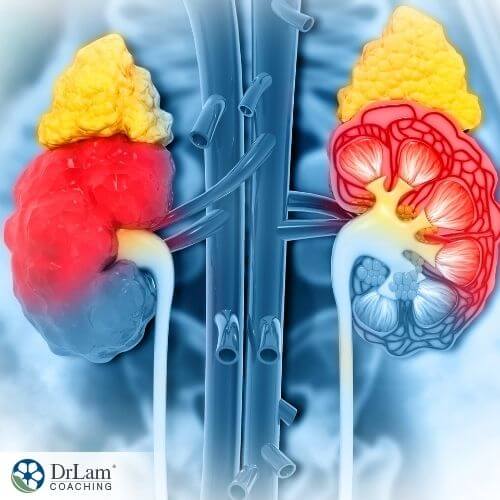
Your adrenals are endocrine system organs that sit atop your kidneys. They release over 50 different hormones. Some of the more well-known of which are epinephrine (also known as adrenaline), norepinephrine, and cortisol. They can also be the site of adrenal tumor.
The glands themselves are made up of two parts – the cortex and the medulla. Each part is responsible for releasing different hormones. The cortex, which is the outer layer, releases hormones involved in blood pressure regulation and metabolism, as well as hormones that affect your appearance, such as your body hair and body shape. Some note-worthy hormones released by the adrenal cortex include:
The medulla, or inner part, is what releases the catecholamines, or stress hormones, epinephrine and norepinephrine. These hormones are involved in your fight or flight response, helping your body prepare to face the stressor by increasing your heart rate, your breathing rate, and your level of alertness.
 Cortisol is also involved when we talk about Adrenal Fatigue Syndrome, or AFS. AFS is the condition that develops when your body is under chronic stress. Its symptoms include fatigue, weight gain, sleep disturbance, brain fog, anxiety, mild depression, hair loss, loss of libido, PMS, infertility, dry skin, salt and sugar cravings, hypoglycemia, lowered immunity, heart palpitations, blood pressure issues, and other issues.
Cortisol is also involved when we talk about Adrenal Fatigue Syndrome, or AFS. AFS is the condition that develops when your body is under chronic stress. Its symptoms include fatigue, weight gain, sleep disturbance, brain fog, anxiety, mild depression, hair loss, loss of libido, PMS, infertility, dry skin, salt and sugar cravings, hypoglycemia, lowered immunity, heart palpitations, blood pressure issues, and other issues.
Although the symptoms of adrenal tumors depend on the type of adrenal tumor you have, some common ones include:
As you can see, many of these symptoms are also present in AFS. And it makes sense, since both conditions affect the adrenal glands and their functioning. And knowing how many key hormones the adrenal glands produce, you can understand why any condition that impacts them can have such a wide range of symptoms.
But, as we’ll discuss, that’s not the only reason.
The adrenals are part of the Hormone Circuit of your NeuroEndoMetabolic (NEM) Stress Response. The NEM is your body’s global response to stress, and it’s composed of six circuits: The Hormone, the Bioenergetics, the Cardionomic, the Neuroaffect, the Inflammation, and the Detoxification circuits. And as one of the NEM’s first responders, if the adrenals dysregulate, that affects all the other components of the other six circuits.
 The Hormone Circuit itself is composed of your adrenal glands, your thyroid, and your pancreas. And when one component is affected, so are the others. That may be why with an adrenal tumor, you can experience hyperglycemia and diabetes. The pancreas isn’t as effective at insulin production and release as it should be. Also, you may get fatigue and weight issues, as your thyroid, which regulates your basal metabolic rate, is effected.
The Hormone Circuit itself is composed of your adrenal glands, your thyroid, and your pancreas. And when one component is affected, so are the others. That may be why with an adrenal tumor, you can experience hyperglycemia and diabetes. The pancreas isn’t as effective at insulin production and release as it should be. Also, you may get fatigue and weight issues, as your thyroid, which regulates your basal metabolic rate, is effected.
The type of adrenal tumor plays a big role in the symptoms picture:
There are a few genetic conditions that can increase the risk for developing an adrenal tumor and other adrenal issues. They include Multiple Endocrine Neoplasia type 2, Paraganglioma syndrome, Li-Fraumeni syndrome, Von Hippel-Lindau disease, Beckwith-Wiedemann syndrome, and Neurofibromatosis type 1 (or Recklinghausen’s disease).
Although not everyone with these conditions will develop an adrenal tumor, it’s important that you take the necessary precautions to keep your adrenals and endocrine system as healthy as possible in order to avoid any unnecessary risks.
 AFS does not cause adrenal tumors, and neither does any kind of NEM dysregulation. But they can weaken your system so that you become more susceptible to developing chronic conditions, including tumors. And they can also aggravate conditions you may already have. Lastly, they can present symptoms that you can confuse with other conditions, leading you through a maze of misdiagnoses and unsuitable treatment protocols. That on its own can also create a lot of stress on your body.
AFS does not cause adrenal tumors, and neither does any kind of NEM dysregulation. But they can weaken your system so that you become more susceptible to developing chronic conditions, including tumors. And they can also aggravate conditions you may already have. Lastly, they can present symptoms that you can confuse with other conditions, leading you through a maze of misdiagnoses and unsuitable treatment protocols. That on its own can also create a lot of stress on your body.
Adrenal tumor diagnosis usually involves blood and urine tests, checking cortisol levels, biopsies of the growth, MRI or CT scans, and adrenal vein sampling. If you have AFS, however, it cannot be ruled out through such tests. It requires the skillful eye of an experienced professional. It involves taking a thorough medical history as well as a full inventory of symptoms.
If you do have an adrenal tumor, along with the treatment that your doctor will recommend for your specific tumor type, it would be a good idea to also take up an adrenal fatigue recovery protocol. This includes managing your stress levels, balancing your electrolytes, eating an adrenal fatigue diet that will replenish your lost nutrient and energy stores, keeping your blood sugar levels as stable as possible, getting a lot of rest and sleep, and taking some gentle supplements to fill in any nutritional gaps and to give your body a boost. Gentle forms of detoxification and exercise may also be useful.
But just like with adrenal tumor treatment, it’s important to get an adrenal fatigue recovery program that suits your specific condition and needs. A recovery program for someone with less advanced AFS and no adrenal tumors will be significantly different than for someone with advanced AFS and adrenocortical cancer, for example.
Adrenal tumors can be benign or malignant. They can also cause your adrenal hormone levels to change, which is what is mainly responsible for the symptoms you get. Adrenal fatigue shares many of these symptoms.
Depending on the type of adrenal tumor, you may require surgery and/or hormone treatment. With some tumors, you can just observe them and only treat if they progress. But either way, doing an adrenal fatigue recovery protocol that helps rebalance your Hormone Circuit is a good idea as well. That helps support your body as a whole.
But you also need to do this under supervision, so that you don’t accidentally aggravate your condition or interfere with the adrenal tumor treatment given to you by your doctor.
If you have questions about how to deal with adrenal tumors, AFS, or NEM dysregulation, you can contact the Dr. Lam Coaching team. We can offer you a free** no-obligation phone consultation at +1-626-571-1234 where we will privately discuss your symptoms and what your options are. You can also send us a question through our Ask The Doctor system by clicking here.
Issues with blood pressure, weight gain, weakness, fatigue, and anxiety are common adrenal tumor symptoms. The problem is that they also resemble many other conditions. So in order to make sure you are diagnosed and treated correctly, you need to know what to do. Especially if you have adrenal fatigue.
